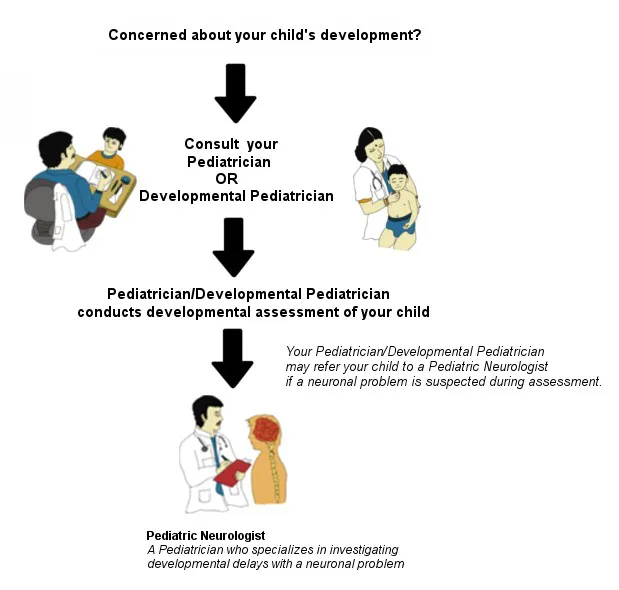Developmental Pediatricians and Child Development
In the realm of child development, the guidance of a developmental pediatrician is invaluable. This article delves into the world of developmental pediatricians, shedding light on their vital role in assessing and nurturing children’s growth and behavior. Discover how their expertise contributes to identifying developmental concerns and fostering a bright future for young minds.
Role of Developmental Pediatricians:
Developmental pediatricians are instrumental figures in the journey of child development. They specialize in evaluating developmental milestones and behaviors, ensuring children achieve their fullest potential. By closely observing a child’s progress and identifying any delays or disorders, these professionals provide crucial guidance for intervention and support, fostering optimal growth.
Qualifications and Training:
Becoming a developmental pediatrician requires a comprehensive educational background and specialized training. These experts possess medical degrees coupled with additional training in pediatrics and developmental psychology. This unique blend equips them to navigate the intricate landscape of child development, combining medical knowledge with a deep understanding of cognitive and emotional growth.
When to Consult a Developmental Pediatrician:
Parents and caregivers play a vital role in a child’s development, but there are instances when professional guidance is essential. If you notice signs like speech delays, social interaction challenges, or difficulty with motor skills, consulting a developmental pediatrician is recommended. Early intervention can lead to better outcomes, making timely assessment a crucial step in ensuring a child’s well-being.
Assessment Process:
The assessment journey with a developmental pediatrician involves a meticulous and comprehensive process. Utilizing standardized tools and observations, these professionals evaluate various aspects of a child’s development. They assess language skills, motor coordination, social interactions, and more. This holistic approach enables them to pinpoint strengths and areas needing attention, guiding the creation of an effective intervention plan.
Common Developmental Disorders:
Developmental pediatricians are adept at identifying and diagnosing various developmental disorders. Conditions such as autism spectrum disorder, attention-deficit/hyperactivity disorder (ADHD), and learning disabilities fall within their purview. Through thorough evaluations, these experts can determine the presence of such disorders and devise strategies to manage and improve the child’s quality of life.
Individualized Treatment Plans:
No two children are alike, and neither are their developmental needs. Developmental pediatricians excel in creating individualized treatment plans tailored to each child’s unique circumstances. These plans encompass a range of interventions, including speech therapy, occupational therapy, and behavior interventions. By customizing approaches, developmental pediatricians empower children to thrive despite developmental challenges.

Collaborative Care:
The journey to support a child’s development is a collaborative effort. Developmental pediatricians work alongside a team of professionals, including speech therapists, occupational therapists, educators, and parents. This team approach ensures comprehensive care that addresses the child’s needs from multiple angles. Collaborative care enhances the effectiveness of interventions and fosters well-rounded development.
Parent and Caregiver Guidance:
Developmental pediatricians don’t just support children; they empower parents and caregivers as well. These experts provide guidance on fostering development at home. From communication strategies to interactive play ideas, parents gain valuable insights to engage their children in meaningful ways. Developmental pediatricians serve as partners in nurturing a child’s growth and progress.
FAQs about Developmental Pediatricians and Child Development
Q: What is a developmental pediatrician?
A: A developmental pediatrician is a medical professional specializing in evaluating and managing developmental and behavioral concerns in children.
Q: When should I consider consulting a developmental pediatrician?
A: If you notice delays in your child’s speech, motor skills, or social interactions, it’s advisable to consult a developmental pediatrician for assessment and guidance.
Q: What does the assessment process involve?
A: The assessment process includes observing and evaluating various aspects of your child’s development, such as language, motor skills, and interactions.
Q: What are some common developmental disorders that developmental pediatricians address?
A: Developmental pediatricians diagnose and manage conditions like autism spectrum disorder, ADHD, intellectual disabilities, and more.
Q: How are treatment plans created by developmental pediatricians?
A: Treatment plans are tailored to each child’s needs, combining interventions like therapy, behavior modification, and educational support.
Q: Is collaborative care important in child development?
A: Yes, collaborative care involves a team of professionals, including developmental pediatricians, therapists, educators, and parents, working together for comprehensive support.
Q: Can developmental pediatricians guide parents in supporting child development at home?
A: Absolutely, developmental pediatricians offer guidance on communication strategies, interactive play, and activities to enhance a child’s growth.
Q: Is early intervention crucial in child development?
A: Yes, early intervention can significantly improve outcomes for children with developmental challenges, making timely assessment essential.
Q: Are developmental pediatricians trained differently from other pediatricians?
A: Yes, developmental pediatricians undergo specialized training in both pediatrics and developmental psychology to address unique needs.
Q: How can I find a qualified developmental pediatrician?
A: Seek referrals from your child’s pediatrician, local hospitals, or educational institutions. Online resources and professional associations can also provide valuable information.
Conclusion:
In the intricate tapestry of child development, developmental pediatricians emerge as beacons of expertise and support. Their role transcends mere diagnosis; it encompasses fostering potential, offering solutions, and igniting hope. By harnessing a deep understanding of child psychology and medical science, these professionals pave the way for children to overcome challenges and flourish.




